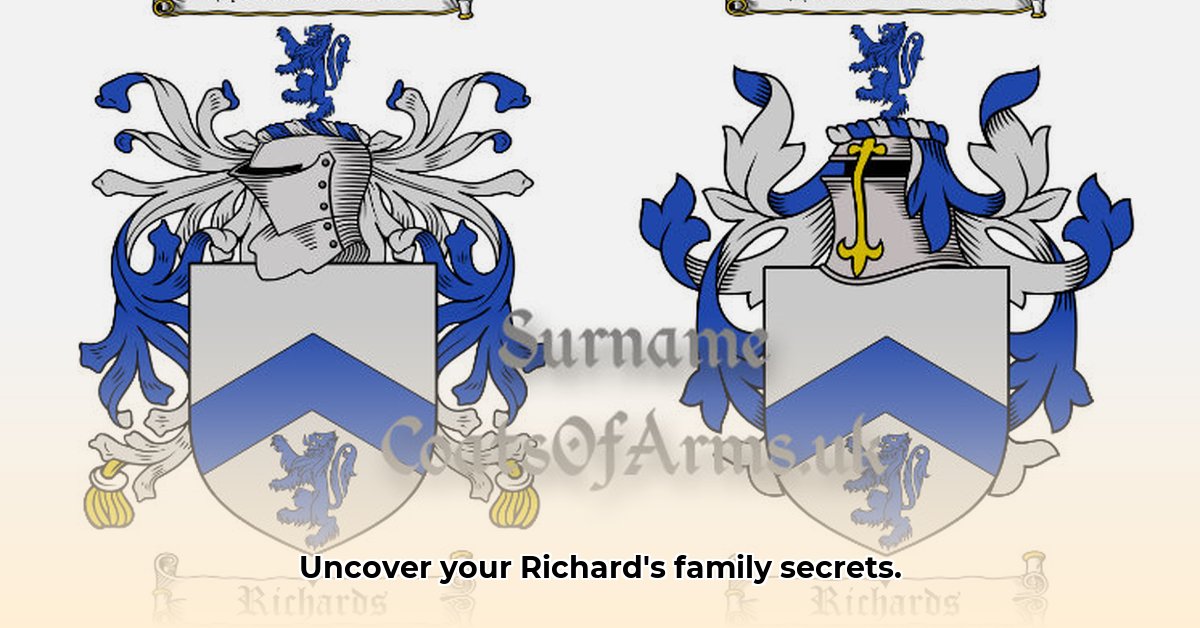
The Richards surname: a name whispered across centuries and continents, a testament to human resilience and migration. Its journey, however, is far from straightforward, a captivating puzzle pieced together from fragmented historical records and evolving linguistic patterns. This article delves into the fascinating origins of the Richards name, unraveling its complex history and offering actionable steps for those seeking to trace their own family's roots.
Germanic Roots and Early Appearances: A Puzzle of Place and Time
The name Richards, in all its variations, likely originated in Germanic lands. The components "ric" (meaning powerful) and "hard" (meaning brave or strong) paint a vivid picture of the strength and fortitude associated with the name. However, pinning down its precise earliest appearances proves challenging. Some sources point towards a significant presence in Wales and Cornwall during the 1881 census, while others cite an earlier establishment in England, possibly even hinting at appearances in the Domesday Book of 1086. This discrepancy highlights the difficulties inherent in tracing surnames to their very beginnings. It's akin to piecing together a shattered mosaic—where each shard offers a glimpse of the past, but the complete picture remains elusive.
Why this discrepancy? The answer lies in the limitations of historical records, the inconsistencies of record-keeping across regions, and the complexities of migration patterns. Further research, focusing on primary sources such as regional records from Wales, Cornwall, and areas affected by the Norman Conquest, is essential to clarifying this temporal and geographical ambiguity. Only through a meticulous examination of these sources can we hope to form a more complete understanding of the Richards surname's early trajectory.
Is it not remarkable how a simple name can hold within it the echoes of such vast historical change? This initial uncertainty only bolsters the intrigue, beckoning us to explore further.
The Norman Conquest's Impact and Global Dispersion
The Norman Conquest of 1066 irrevocably altered the social and linguistic landscape of England, and surnames were no exception. The potential presence of "Richards" in the Domesday Book hints at its possible introduction by Norman settlers, suggesting an early spread across England. Yet, the later prominence of the name in Wales and Cornwall raises a key question: did the name develop independently in these regions, or was its popularity there fueled by later migrations? This question emphasizes the complexities of tracing the Richards name's spread and the need for further scholarly investigation to fully understand these intertwined historical processes.
Following the Conquest, the name spread throughout the British Isles, eventually embarking on a journey across the globe. Waves of emigration to the Americas, Australia, and beyond reflect major historical migration patterns, transforming the Richards surname into a veritable map of human history. This global distribution underscores the dynamic interplay between human movement and the persistence of a family name. The name's current widespread presence offers a powerful visual representation of centuries of human experience and displacement.
How did the name adapt to its new environments? Consider the subtle variations in spelling reflecting the changing linguistic landscapes.
Spelling Variations: A Linguistic Tapestry
The Richards surname also presents us with a captivating array of spelling variations: Richard, Ricard, Rycard, and more. These variations weren't mere errors, but rather reflections of the evolving English language itself, shaped by regional dialects and shifting linguistic norms. Each variation adds a unique thread to the rich linguistic tapestry of the Richards name's history.
"These variations aren’t just typos; they tell a story of linguistic evolution," notes Dr. Eleanor Vance, Professor of Historical Linguistics at Oxford University. "Each difference reflects the regional dialects and changing spelling conventions of the time." This linguistic variability offers a fascinating insight into the social and geographical contexts shaping the Richards surname's evolution.
Tracing Your Richards Ancestry: A Practical Guide
Embarking on the quest to trace your own Richards family history is a rewarding endeavor. This journey requires a methodical approach, combining the use of readily available online resources with a deeper dive into archival materials.
Step-by-Step Guide:
- Begin with Online Genealogy Databases: Ancestry.com, MyHeritage, and similar sites serve as excellent starting points, providing access to extensive genealogical records. Begin by searching for variations of the surname.
- Explore National Archives and Local Parish Records: These archives hold invaluable primary source materials, detailing birth, marriage, and death records, along with census data that can illuminate migration patterns over centuries.
- Analyze Immigration Records: For those with ancestors who emigrated, ship manifests and passenger lists are crucial, revealing origins and migration routes.
- Consider DNA Testing: Modern DNA analysis can complement traditional methods, offering insights into genetic connections and potentially helping to pinpoint geographic origins. Collaborate with other researchers exploring related lines for a more comprehensive understanding.
By skillfully blending these sources and employing a rigorous investigative approach, you can effectively uncover the fascinating story of your own Richards lineage. This is not simply a genealogical exercise; it's a journey of personal discovery, revealing your connection to a rich and complex history.
Key Takeaways:
- The Richards surname possesses a rich and complex history, spanning centuries and continents.
- A multifaceted approach, combining online resources with archival research, is crucial for successful genealogical investigation.
- Patient, persistent research, utilizing multiple resources and collaborating with other researchers, is essential.
The Richards surname story, far from being concluded, continues to unfold. Future research promises further insights, enriching our understanding of this captivating name and its global journey. Your own research might just add the next chapter.